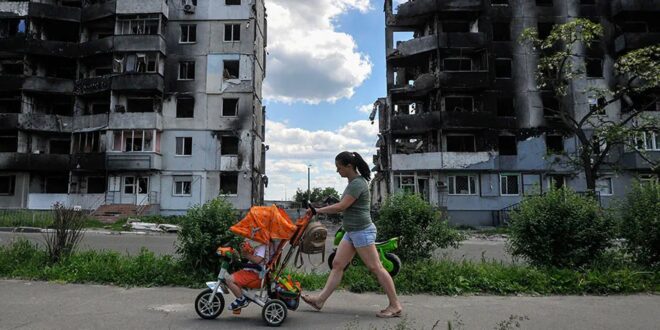In the gathering war of attrition in Ukraine, Russia has the upper hand – and Ukraine’s only hope is for international support to now be stepped up.
The Russian war in Ukraine is entering its third stage and is finally becoming a war of attrition. This requires readiness not only on the part of Ukraine, but also its international partners. The short initial race is over, and now the winner will be the one who has not only the will to win, but also enough resources to continue to maintain the current dynamics of the confrontation. It is obvious that despite international sanctions, the Russian economy is in a much better condition than the destroyed Ukrainian economy. Wars of attrition are won by the rear, and the only rear left in Ukraine is the international coalition in support of Ukraine, which was formed in April 2022 in Rammstein, Germany.
The brilliant military successes demonstrated by Ukraine in the first phase of the war – the so-called Battle of Kyiv, when Russia sought to achieve its goals by brazen invasion – gave both Ukrainians and their international partners a false impression of the weakness of Russian forces and the ability of Ukrainian troops to easily defeat them. This did not take into account the fact that the Russian invasion of Ukraine was a continuation of a military demonstration rather than a quality military operation, and was intended mostly for psychological effects rather than real clashes with the Armed Forces of Ukraine.
The Russian leadership was firmly convinced that Ukrainian President Volodymyr Zelensky would inevitably capitulate in the first days of the aggression, which would make organised international support for Ukraine impossible and reduce the Russian operation in Ukraine to suppressing some centres of self-organised resistance. This is indicated by the nature of the invasion in the form of long, largely unprotected convoys, which became relatively easy prey for Ukrainian aircraft and artillery. The Russians also miscalculated the state and mobility of Ukraine’s air defence, which they have been unable to destroy despite numerous missile strikes, either in the first days of the war or after 100 days of confrontation.
It is clear that in the conditions of a protracted war and a continuing naval blockade, the economy of Ukraine will have minimal chances of recoveryIt is obvious that the Russian defeat in the second stage of the war, when the Russians tried to concentrate all their efforts on the encirclement and capture of the Ukrainian forces in Donbas, was the result of a significant reassessment of their own capabilities. The scale of the territory, the number of troops of the Armed Forces of Ukraine, the presence of prepared defensive positions, the high morale of the Ukrainian military and the demoralised nature of Russian troops after the defeat and losses in the first stage of the war all left little chance of victory for Moscow. The Russians might have hoped for significantly better results if they had not tried to attack Kyiv and other northern regions of Ukraine from the beginning, but instead immediately focused all their efforts exclusively on Donbas and the land corridor to Crimea, as Ukrainian experts expected.
However, this marked the end of Russia’s irrational behaviour. Although many expected Putin to declare a total war on 9 May and begin a general mobilisation, the Russian leadership focused on depleting Ukraine, taking full advantage of its military, economic and energy advantages. This was immediately apparent from the changing behaviour of Russian troops on the line of contact, where they increasingly used massive artillery fire, taking advantage of both the number of long-range systems at their disposal and the lack of any need to save ammunition. It is clear that in the conditions of a protracted war and a continuing naval blockade, the economy of Ukraine – which has been destroyed by the war – will have minimal chances of recovery. The ongoing fuel crisis in Ukraine is likely to be exacerbated by a gas crisis as winter closes in. The financial and budgetary crisis may leave the Ukrainian government without the ability to pay salaries and pensions and create the preconditions for social destabilisation.
Ukraine’s only hope for victory in the protracted conflict with Russia is strong support from the international coalition. In the near future, all the efforts of the Russian secret services will be focused on destroying this support. An awareness that Ukraine is only the frontline of Russia’s war against Western civilisation, a recognition of the West’s role as a reliable rear in this war, and an understanding that it is better to be a rear than a line of contact – all this will now be crucial for both EU and NATO political leaders and their respective populations to have.
 Eurasia Press & News
Eurasia Press & News




